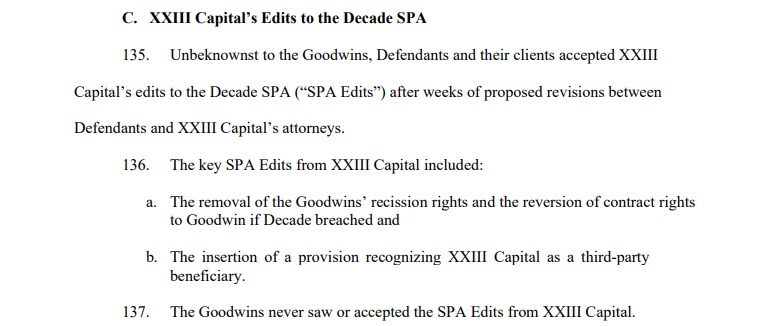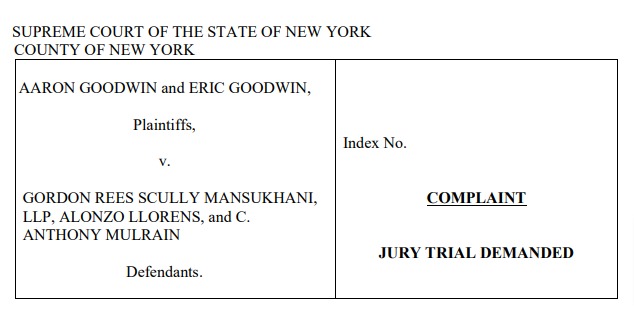National law firm Gordon Rees Scully Mansukhani, LLP (commonly known as Gordon Rees) and two of its former partners, Alonzo Llorens and C. Anthony Mulrain, are being sued by veteran basketball agents Aaron Goodwin and Eric Goodwin. The Complaint, which seeks damages in excess of $92 million, was filed on January 11 in New York.
The Goodwins, who represent the likes of Damian Lillard and DeMar DeRozan (and once represented LeBron James), complain that Gordon Rees and its former partners conspired and assisted their clients in fraudulently misleading the Goodwins into selling their sports agencies Goodwin Associates Management Enterprises, Inc. (GAME) and Goodwin Sports Management, Inc. (GSM), and thereafter attempted to cover up the wrongdoing.
The backstory is that Christopher Aden and Dorsey James, through a company called Decade S.A.C., LLC (represented by Gordon Rees), sought to purchase the companies owned by the Goodwins. According to the Complaint, Gordon Rees and its former partners knowingly and fraudulently affixed the Goodwins’ signature pages to an alternative version of deal documents that the brothers never agreed to nor even reviewed. These deal documents involved a third-party lender called XXIII Capital, which loaned $20 million to Decade in order to purchase the Goodwin companies.
Apparently, Decade had no financial assets or investors, but Aden and James were obsessed with a claimed vision for creating a $1 billion Black-owned sports conglomerate with the Goodwin businesses at the forefront. Importantly, the Goodwin brothers insist that they always made it clear that any deal would need to be at a particular purchase price, include reversion rights, and prohibit third-party beneficiaries, and that the final purchase transaction failed to include the mandatory provisions. The Goodwin brothers were not happy to learn, thereafter, that XXIII Capital was brought to the table to serve as a third-party beneficiary despite their clear instructions that the existence of any third-party beneficiaries would be a nonstarter for a potential deal.
“Defendants then facilitated a fraudulent in-person “closing” on the purchase transaction in New York City without inviting the Goodwins or providing them with copies of the alternative transaction documents,” states the Complaint. Apparently, the lawyers and their clients offered a security interest on the Goodwins’ contract receivables as collateral for the XXIII Capital loan, but Decade did not even own the Goodwin entities at that point and the Goodwins were unaware of the offer.

The Complaint argues that Decade failed to pay approximately $25 million owed to the Goodwins. It further states that the loan agreement between Decade and XXIII Capital anticipated that Aaron Goodwin would remit payments to a lockbox controlled in XXIII Capital, which was in direct conflict with the express terms that the brothers had agreed to. Then, XXIII Capital sent irrevocable direction letters (IDLs) to clients of the Goodwins, directing them to make commission payments owed to the Goodwins to XXIII Capital instead.
“From 2017 through and including 2021, the IDLs directly caused reputational and business harm to the Goodwins thereby denying and impeding their access to the NBA’s top recruits, including several recruits with whom the Goodwins had cultivated important relationships prior to the transmittal of the IDLs,” according to the Complaint.
Decade ended up filing for bankruptcy, which is how the Goodwins explain they learned of Gordon Rees’ and its former attorneys’ misdeeds. Per the Complaint, a federal bankruptcy judge found that the Goodwins were defrauded by Aden, aided and abetted by James and Aden’s attorneys, who were those attorneys employed by Gordon Rees, and that the lawyers were, at worst, “downright fraudsters.” Aaron Goodwin claims he had doubts about Aden and James’ legitimacy and financial ability to purchase the companies, but that he was personally assured by Mulrain that there was nothing to worry about.
The lawsuit pending in New York alleges that Gordon Rees and its former partners, Alonzo Llorens and C. Anthony Mulrain, should be held liable for fraudulent inducement, fraudulent misrepresentation, aiding and abetting fraud, civil conspiracy to commit fraud, and breach of fiduciary duty. The Goodwin brothers seek approximately $92 million in past and future lost profits from player salary and endorsement contracts as well as lost corporate opportunities, exclusive of punitive damages, interest, costs, disbursemenets and counsel fees claimed.
